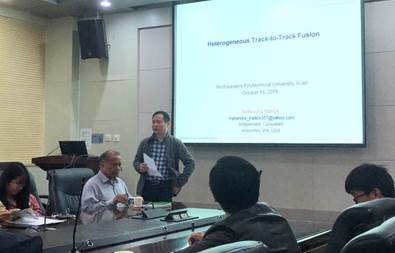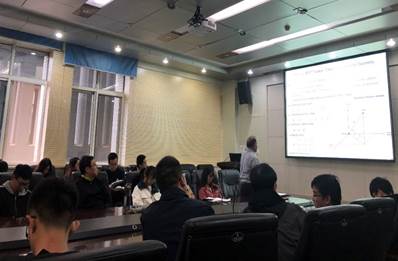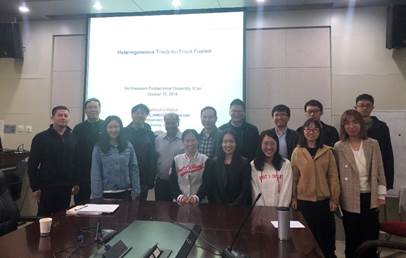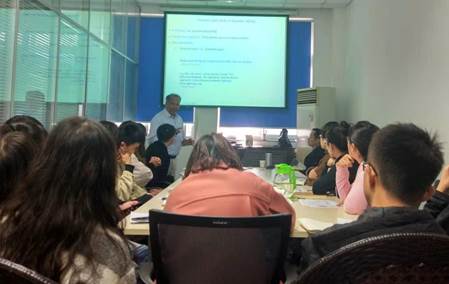应我院“信息融合技术”教育部重点实验室邀请,信息融合、目标跟踪领域知名专家Mahendra Mallick博士来我校进行学术交流和合作,期间面向青年教师和研究生做了关于领域学术进展和前沿工作以及科技论文写作方面的报告,并同与会的教师和研究生进行了深入的探讨交流。
10月15日上午10:00—12:30,Mallick博士在必威341会议室开展了题为“Heterogeneous Track-to-Track Fusion in 2D and 3D”的学术报告。李天成教授、杨峰副教授、王增福副教授、兰华副教授、焦连猛等老师以及30余位博士、硕士参加了本次报告,报告由徐林峰副教授主持。
报告主要围绕多传感器跟踪系统中的异构航迹融合(T2TF)问题展开。Mallick博士首先对T2TF问题的研究背景和技术难点进行了简要回顾,然后将自己目前在二维和三维T2TF问题中的研究成果进行了介绍,并详细阐述了三维T2TF的原理和优势,最后对该技术的未来发展方向做了展望。
Mallick博士的报告语言条理清晰、内容生动具体,使师生们对T2TF问题有了清晰的认识和理解。报告过程中,师生就异构航迹融合技术的瓶颈和应用等相关问题与Mallick博士进行了热烈讨论,现场气氛十分活跃。

图1 徐林峰副教授主持报告

图2 Mallick博士作学术报告

图3 与会人员合影留念
10月17日上午10点,Mallick博士继续做了题为“Technical Writing for Scientists and Engineers”的学术报告,对科技论文写作方面的问题与广大师生进行交流。报告在必威343会议室进行,由徐林峰副教授主持。
Mallick博士首先系统的介绍了论文写作的步骤,就题目、摘要、引言、结论、附录等模块的写作方法展开详细讨论;通过作为期刊编辑的长期积累,总结并列举了科技论文写作中易出现的表述一致性、数学符号表示、标点使用等细节错误;最后给出了科技论文的写作原则和有益的技巧,并推荐了相关参考资料。报告期间,同学们针对各自在学术论文写作中遇到的问题与Mallick博士进行了热烈的讨论与交流。
Mallick博士的两次报告使师生对T2TF技术的现状及进展有了更深入的了解,就科技论文写作原则和实用方法有了更清晰的认识。此次交流活动对开阔我院师生的学术视野、激发创新思维、提高写作能力、营造更为积极活跃的科研氛围起到了良好的促进作用。

图4 Mallick博士作学术报告
报告人简介
Dr. Mahendra Mallick is an independent consultant. He received a Ph.D. degree in Quantum Solid State Theory from the State University of New York at Albany and an MS degree in Computer Science from the Johns Hopkins University. He is a co-editor and an author of the book, “Integrated Tracking, Classification, and Sensor Management: Theory and Applications”, Wiley-IEEE, 2012. He was the Lead Guest Editor of the Special Issue on Multi-target Tracking in the IEEE Journal of Selected Topics in Signal Processing, June, 2013. He is a senior member of the IEEE and was the Associate Editor-in-chief of the online journal of the International Society of Information Fusion (ISIF) during 2008-2009. He is currently an Associate Editor for target tracking and multi-sensor systems of the IEEE Transactions on Aerospace and Electronic Systems. He was member of the board of directors of the ISIF during 2008-2010. He has worked on the satellite orbit and attitude determination in NASA programs. His research interests include nonlinear filtering, out-of-sequence measurement (OOSM) algorithms, and measures of nonlinearity, GMTI filtering and tracking, multi-sensor multi-target tracking, multiple hypothesis tracking, random-finite-set-based multi-target tracking, space object tracking, distributed fusion, and heterogeneous track-to-track fusion.



